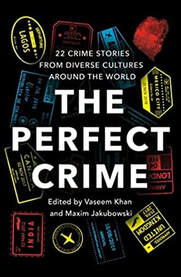
Some authors featured here certainly deliver, while others disappoint. As with any multiple-writer anthology, a reader will likely find some entries stronger than others. With The Perfect Crime, however, I found myself wading through too many generic stories, tales that might be set in the Australian outback or feature characters named Kaeto and Tej but whose predictable plotlines could be transplanted anywhere with a Caucasian cast and suffer no culture shock. I tended to get ahead of many of these unsatisfying stories because their authors play it safe and deliver familiar tropes, whether it’s an unconvincing con-versus-con story or a lover’s triangle where one of the sides takes a telegraphed revenge on the other two.
When an author rises to the challenge to break from genre tradition and explore their own voice and cultural identity, the effect is memorable and sometimes visceral. Two excellent entries confront the subject of racial hatred and the violence it provokes head on. In John Vercher’s “Either Way I Lose,” a light-skinned African-American man in 1919 Omaha gets caught up in politics and prejudice and must decide how far he will go to provoke – or stop – murder within his community. With “The Yellow Line” and its menacing first sentence “He followed her home again,” Ausma Zehanat Khan relates the story of Haniya, a young Muslim woman who becomes the target of a privileged banker who takes sadistic pleasure in stalking his quarry. Both stories are carefully crafted, understated in their prose, and unflinching as they build to their climaxes; each offers a sharp portrait of minority individuals trying to survive within a culture dismissive and often openly hostile to them.
Other writers make great use of the mindset and landscape of their characters. For me, standouts include “For Marg” by the prolific J.P. Pomare, a somber story conjuring up the wet, cold isolation of the New Zealand hills as a widowed farmer tries to stop his sheep from disappearing. Silvia Moreno-Garcia’s “The Land of Milk and Honey” pays homage to Spanish domestic drama by placing tentative young lovers in conflict with the girl’s repressive patriarch of a father. With “Buttons”, Imran Mahmood explores the psychology of a sociopath in a focused, highly effective sketch of a London man prowling for a victim.
Sheena Kamal’s “Sundown” adroitly tackles the harsh topics of sex trafficking and racial violence in the U.S. Pacific Northwest, the title referring to towns where dark-skinned people must leave by sunset or face the consequences. “Paradise Lost” by Abir Mukherjee strikes a welcome lighter tone as an expatriate Scot criminal, stuck hiding out on a posh island retreat for the ultra-wealthy, schemes to return to the UK. American writer Walter Mosley rounds out the collection with “Bring Me Your Pain,” the story of Acme Green, a gentle man trying to secure a patent for his very unique machine.
As for the other 14 stories featured in The Perfect Crime, a few were enjoyable while others seemed to waste their thematic promise by providing rote plotlines and unremarkable characters. Nelson George’s entry “The Ten Lessons of Big Matt Silver” is notable for its Brooklyn hip-hop industry setting and its screenplay format but loses its impact as it tells far more than it shows, keeping the reader at a distance. (The story becomes a summary treatment rather than a script: “As Matt masterminds the cranberry campaign and worries about the FBI investigation, his relationship with Ruby deteriorates.”)
I wish other writers had shown George’s interest in style and story experimentation. Instead, too many selections cover very familiar ground, even with a location or a character that nods to the diversity the editors are trying to encourage. I am also a bit bewildered about the anthology’s choice of title – the crimes collected here are perfect, imperfect, and in two instances not really crimes at all. Still, I appreciate the editors’ efforts to present and celebrate modern crime fiction from authors around the world. Thanks to The Perfect Crime, I know which authors’ voices I plan to seek out… and which ones I may want to skip for now.
 RSS Feed
RSS Feed